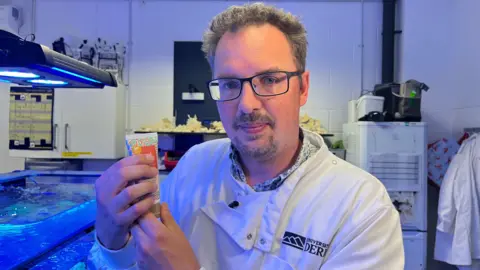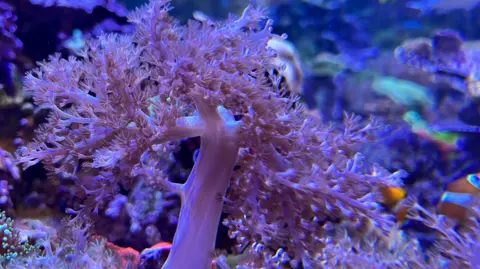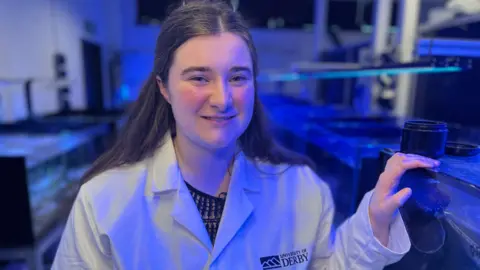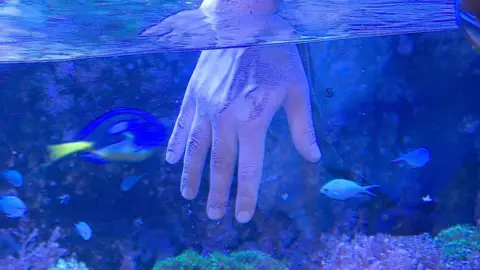'World's first coral-friendly sunscreen' unveiled
 BBC
BBCScientists at the University of Derby say they have developed a sunscreen which could help corals grow.
The team was working on the creation of a science-backed standard for reef-friendly sun protection when their lab experiments showed including certain nutrients in eco-friendly sunscreens helped some coral species grow - with one species increasing by almost a third.
An academic study revealed eight in 10 creams which say they are reef or ocean-friendly have not been rigorously tested, and some include chemicals proven to cause coral bleaching.
The Derby scientists hope their new reef protection factors of gold, silver and bronze will eventually set the global industry standard.

When hundreds of swimmers hit the water at the same time around a quarter of their sunscreen immediately washes off and creates an oily layer in the water.
The impact on coral reefs and the marine life they support can be devastating.
Coral reefs around the world face a multitude of threats from climate change and ocean acidification, and the Derby research team set out to target one of the most preventable "stressors" for these ecosystems.
Inside the University of Derby's Aquatic Research Facility, team leader Prof Michael Sweet demonstrated how a small dab of "bad" sunscreen can start to kill tiny coral samples within hours of being added to laboratory tanks.
"We only started this experiment this morning," he said, fishing out a plug where a small coral fragment seems to be disintegrating.
"Compared to the control tank, you can already see the tissue sloughing off the coral skeleton."

The research started because the team and its commercial partners wanted to create a robust sunscreen accreditation system shoppers could trust.
That meant designing a scientifically-validated test which brands would have to pass before they could claim to be "coral friendly" and earn their "reef protection factor" (RPF) of gold, silver or bronze.
However, when research began, the concept of a coral-friendly sunscreen seemed unlikely.
"Originally I didn't think this was going to be possible," Prof Sweet said.
"When [the nutrient-dense sunscreen] started showing a positive impact we knew we were on to something big."
As part of the research, PhD student Triona Barker was asked to measure how corals responded when exposed to sunscreen without toxic chemicals but with added minerals and nutrients.
The cocktail of ingredients was based on components known to be beneficial for corals.
The cream was first tested to ensure it was safe for humans.
"We then dosed nine tanks over the course of 16 weeks," Ms Barker explained.
"At first we saw a growth of 8%, so we left it a bit longer. After 16 weeks [one coral species] had grown by 29%."
Prof Sweet added: "We're not only avoiding any harm, we're actually feeding the corals as well."

Wary of being accused of cosying up to commercial companies, Prof Sweet was determined the research would be conducted as non-profit.
That meant the university had to pay the cost of the testing.
"That was important to me," said Prof Sweet.
"I had to stand up in front of my peers and the public and say this is truly reef-safe, as we have shown it to be... reaching a scientific consensus was a massive milestone for us."
The research paper showing the university's test design and results is open-access and is now being scientifically reviewed.
The first product to be certified under the new gold accreditation has been supported by the Tourism Authority of Thailand which recently arranged to hand it out on beaches in Thailand in exchange for non-accredited sunscreen.
Now the university has been offered a profit share in Stream2Sea's "Coral Care", with the money ring-fenced for an educational fellowship programme to be launched globally in September.
The project is designed to raise public awareness of how sunscreen can damage marine life, with booklets being sent out to 600 schools.
They also want to encourage manufacturers of other potentially damaging products such as shampoos and cosmetics to seek accreditation.
Follow BBC Derby on Facebook, on X, or on Instagram. Send your story ideas to [email protected] or via WhatsApp on 0808 100 2210.
